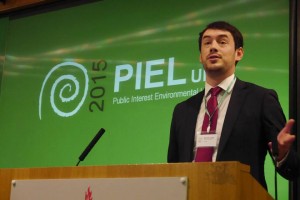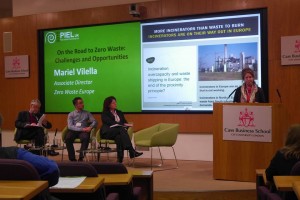Trade is Tribulation? The Public Interest Environmental Law UK Annual Conference, 9 April 2015 – Ali Nihat
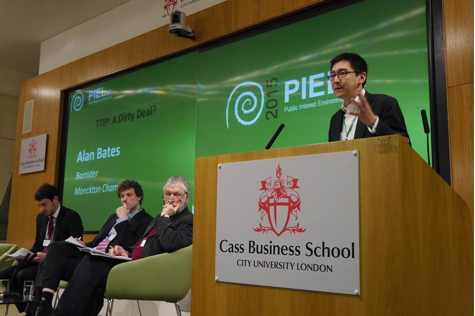
For the third year in a row, City Law School has kindly been an official partner to the Public Interest Environmental Law (PIEL) UK Annual Conference. PIEL UK is a not-for-profit organisation run entirely by University students largely drawn from London institutions. Thanks to City’s support, PIEL UK was able to bring together a group of esteemed speakers from the worlds of law, academia, environmental activism, business and politics to discuss the relationship between trade and the environment.
In semi-secrecy, the European Union and the United States of America – between them accounting for just under 50% of world GDP – are negotiating the most ambitious free trade agreement in history, the Transatlantic Trade and Investment Partnership (TTIP).
The avowed aim has been to cut ‘red tape’ inimical to trade, to create jobs, and to stimulate the two largest economies in the world at a time of recession. Given that trade tariffs between the EU and the US are on average very low, there has been speculation concerning ulterior motives, to say nothing of TTIP’s potentially-calamitous effects, intended or otherwise: conduit for the dominance of energy companies; backdoor to genetically-modified foods; death knell for the NHS. The European Commission has mobilised to assuage these concerns.
TTIP will do more than replace a handful of Bilateral Investment Treaties (BITs) concluded between the US and a number of eastern EU states on the fall of the Iron Curtain. Talks have focused on harmonising European and American regulatory regimes in a range of areas in order to ease market access, with the agreement only kickstarting an ongoing process, complete with its own novel structures coordinating between the two signatories. With negotiations further envisaging investor protection through the right to sue states before special investment tribunals (under so-called Investor-to-State Dispute Settlements, or ISDS), it is clear why the mooted deal is attracting significant interest from the legal world. To name but a few emerging questions: will the European ‘precautionary principle’ in regulatory matters lose out to the profit motive? Will ISDS undermine the rule of law and favour commercial interests? Will much domestic environmental legislation fall foul of the terms of agreement?
Established in 2007, Public Interest Environmental Law (PIEL) UK is a not-for-profit organisation which organises an annual conference on a burning topic in Environmental Law. The event is realised entirely through the sponsorship of Universities, NGOs and law firms. Naturally, the 2015 Conference focused on TTIP and the environmental effects of burgeoning trade. Such a contentious and topical issue warranted close and interdisciplinary analysis. Composed entirely of students from London Universities, including one third from City University, the 2014-2015 PIEL UK Organising Committee laboured for several months to put together a programme of 16 speakers – academics, lawyers, activists and politicians – in one affordable Conference open to the public: Satisfying Consumption: Trade and the Environment. From the very beginning, City University, and the City Law School, assisted in material, advice, and publicity, together with UCL and Queen Mary University London. On April 9 PIEL UK’s 9th Annual Conference was held in Cass Business School’s handsome lecture theatre under City’s kind auspices, and attracted over 100 attendees of all ages and walks of life.
THE CONFERENCE
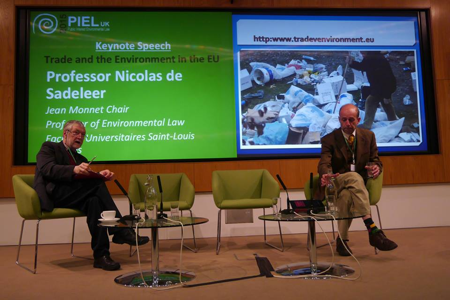
Videos of all talks can be found on PIEL’s YouTube Channel.
The day began with a closely-argued panel session assessing the overall merits and risks of TTIP for the environment and the public interest. While Sam Lowe (Friends of the Earth) warned of a race to the bottom in the regulation of food and other products, Emanuel Adam (BritishAmerican Business) noted the economic rationale and inclusion of a sustainability chapter in the draft agreement. For his part, Alan Bates (Monckton Chambers) stressed continuities with GATT and the existing WTO regime. Next, Sam Fowles (Queen Mary University of London) took to the stage to detail the more insidious dangers of Investor-State Dispute Settlements: a multiform ‘regulatory chill’ that would militate in favour of big business and governments hoping to push through, or retain, environmentally-suspect measures.
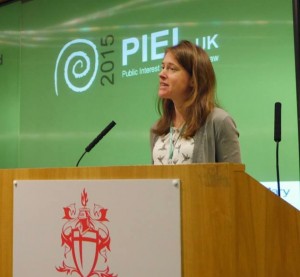
Ruth Bergan (Trade Justice Movement) and Tom Burke CBE (E3G) evidenced the wide-ranging impact of TTIP with presentations on ‘Third Countries’ (that is, non-signatories), and Climate Change, respectively. Asking why the mooted agreement made no clear provision to protect developing countries, Ms. Bergan set out how these ‘ghosts at the Feast’ will be detrimentally affected in myriad ways, including use of TTIP as a template in future trade agreements around the world. While dismissing the utility of Carbons Trading in tackling climate change, Tom Burke explained why TTIP would be an unmitigated disaster for emissions targets. He stressed that above all TTIP would throw up obstacles for countries seeking to pass domestic environmental legislation.
The day’s keynote speech was delivered by esteemed academic Professor Nicolas de Sadeleer, Jean Monnet Chairholder at the Academie de Louvain in Belgium, and author of works such as EU Environmental Law and the Internal Market and Environmental Principles: From Political Slogans to Legal Rules.
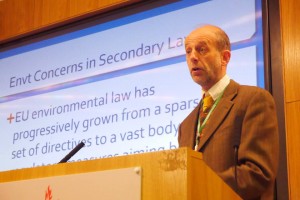
Establishing early on how environmental protection came to be placed on equal footing with the internal market as a core EU objective, Professor de Sadeleer went on to reveal the disconnect between apparent parity and practice.
The keynote spoke of the challenges facing Environmental Policy in Europe, observing, inter alia, the uneasy relationship between Competition Law and Environmental Law, the reluctance of the European Commission to bring Members to ECJ for failing to implement Environmental Directives, and the fact that environmental legislation may easily fall within the ambit of the principle of free movement of goods.
The second half of the Conference opened with Amelia Womack, deputy leader of the Green Party, setting out the political challenge of reconciling an impetus to increase trade with the need to protect the environment. Kindly taking time from the campaign trail, she spoke against conceiving of the environment in economic terms, and reminded those present that ‘there will be no business on a dead planet.’
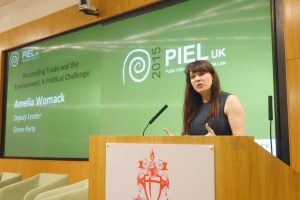
There followed a raft of talks and panels on specific markets and trade-related environmental concerns. Revealing the realities of the global illegal trade in wildlife, Shruti Suresh (the Environmental Investigations Agency) detailed the workings of the international CITES regime (the Convention on International Trade in Endangered Species of Wild Fauna and Flora), and the often corrupt and contradictory approach of the international community on this issue.
The evening panel on tackling Deforestation provided a different perspective of the role of business in environmental issues. Clotilde Henriot and Joseph Weyns (ClientEarth) set out the functioning of Voluntary Partnership Agreements, illustrating that different trade model agreements exist, not all of which are bad news for environmental and social standards. Equally constructive and hopeful, Leonie Lawrence (Global Canopy Programme) outlined how the Forest 500 project is working directly with corporations to eliminate deforestation from global supply chains.
A concluding panel on waste management brought into focus the diverse actors working to bring about a circular economy, and the tools at their disposal. Piotr Barczak (European Environmental Bureau) provided an insider’s perspective of the action being taken by the EU to decouple economic growth from resources use, focusing chiefly on excessive packaging. Looking at electronic waste in Africa, which is set to outstrip European volume this year, Professor Margaret Bates (University of Northampton) argued that bans were less effective than helping to build infrastructure for waste disposal. Mariel Vilella tackled consumer behaviour itself, underlining how it is possible to implement a ‘Zero-Waste’ philosophy across Europe with the techniques and laws we currently possess, following the example of a growing number of municipalities across the continent.
‘Satisfying Consumption: Trade and the Environment’ was a great success, sparking lively debate and, we hope, forging new constructive relationships in the area of environmental study and law.
THE YEAR AHEAD
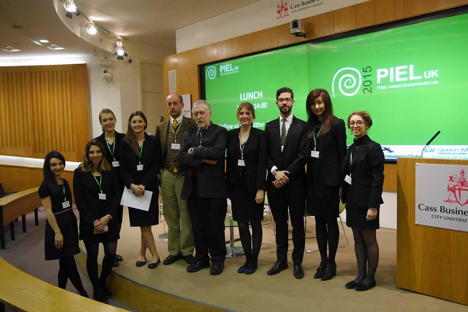
In the new academic year, PIEL UK will be recruiting for a Committee to organise the milestone 10th annual Conference. Please subscribe to our Twitter (@Piel_uk), Facebook and LinkedIn groups to stay informed; you can also register your interest by emailing pieluk@gmail.com. Committee positions are ideal for those interested in environmental, EU and Public law; the opportunity to shape your own academic line-up, liaise with expert speakers, fundraise, and publicise such an event also offers much in the way of professional development.
Ali Nihat is Co-Chair of the PIEL UK 2014-2015 Organising Committee. Ali completed the Graduate Diploma in Law and the Bar Professional Training Course at City Law School. He featured on the City University Mooting team which triumphed in the European Law Students Association (ELSA) ECHR Moot 2014 [see more on this achievement via CityNews and the blog], held in Strasbourg. Many thanks to him for this comprehensive review of the PIEL Annual Conference.
